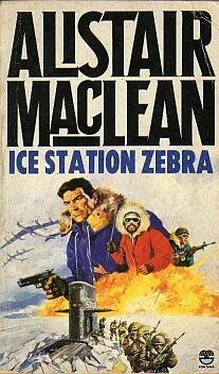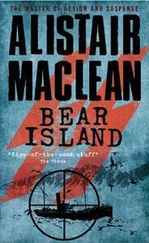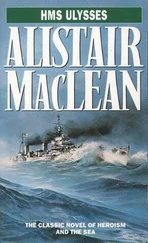Alistair MacLean - Ice Station Zebra
Здесь есть возможность читать онлайн «Alistair MacLean - Ice Station Zebra» — ознакомительный отрывок электронной книги совершенно бесплатно, а после прочтения отрывка купить полную версию. В некоторых случаях можно слушать аудио, скачать через торрент в формате fb2 и присутствует краткое содержание. Год выпуска: 1963, Жанр: Триллер, Боевик, на английском языке. Описание произведения, (предисловие) а так же отзывы посетителей доступны на портале библиотеки ЛибКат.
- Название:Ice Station Zebra
- Автор:
- Жанр:
- Год:1963
- ISBN:нет данных
- Рейтинг книги:3 / 5. Голосов: 1
-
Избранное:Добавить в избранное
- Отзывы:
-
Ваша оценка:
- 60
- 1
- 2
- 3
- 4
- 5
Ice Station Zebra: краткое содержание, описание и аннотация
Предлагаем к чтению аннотацию, описание, краткое содержание или предисловие (зависит от того, что написал сам автор книги «Ice Station Zebra»). Если вы не нашли необходимую информацию о книге — напишите в комментариях, мы постараемся отыскать её.
Ice Station Zebra — читать онлайн ознакомительный отрывок
Ниже представлен текст книги, разбитый по страницам. Система сохранения места последней прочитанной страницы, позволяет с удобством читать онлайн бесплатно книгу «Ice Station Zebra», без необходимости каждый раз заново искать на чём Вы остановились. Поставьте закладку, и сможете в любой момент перейти на страницу, на которой закончили чтение.
Интервал:
Закладка:
"So they decided to bring it down in the vicinity of Drift Ice Station Zebra?" Jolly asked quietly. It was a sign of his perturbation that he didn't even call me "old boy."
"Drift Ice Station Zebra wasn't even in existence at the time the satellite' went haywire, although all preparations were complete. We had arranged for Canada to lend us a St. Lawrence ice breaker to set up the station, but the Russians, in a burst of friendly goodwill and international cooperation, offered us the atomic-powered «Lenin», the finest ice breaker in the world. They wanted to make good and sure that Zebra was set up in good time. It was. The eastwest drift of the ice cap was unusually slow this year, and almost eight weeks elapsed after the setting-up of the station until it was directly beneath the 'flight trajectory of the satellite."
"You «knew» what the Russians had in mind?" Hansen asked.
"We knew. But the Russians had no idea whatsoever that we were on to them. They had no idea that one of the pieces of equipment which was landed at Zebra was a satellite monitor which would tell Major Halliwell when the satellite received the radio signal to eject the capsule." I looked slowly around the Zebra survivors. "I'll wager none of you knew that. But Major Halliwell did — and the three other men who slept in his hut where this machine was located.
"What we did not know was the identity of the member of Zebra's company who had been suborned by the Russians. We were certain someone «must» have been, but we had no idea who it was. Every one of you had first-class security clearances. But someone was suborned — and that someone, when he arrived back in Britain, would have been a wealthy man for the rest of his life. In addition to leaving what was in effect an enemy agent planted in Zebra, the Soviets also left a portable monitor — an electronic device for tuning-in on a particular radio signal which would be activated inside the capsule at the moment of its ejection from the satellite. A capsule can be so accurately ejected three hundred miles up that it will land within a mile of its target, but the ice cap is pretty rough territory and dark most of the time, so this monitor would enable our friend to locate the capsule, which would keep on emitting its signal for at least, I suppose, twenty-four hours after landing. Our friend took the monitor and went out looking for the capsule. He found it, released it from its drogue, and brought it back to the station. You are still with me, gentlemen? Especially one particular gentleman?"
"I think we are all with you, Dr. Carpenter," Commander Swanson said softly. "Every last one of us."
"Fine. Well, unfortunately, Major Halliwell and his three companions also knew that the satellite had ejected its capsule — don't forget that they were monitoring this satellite twenty-four hours a day. They knew that someone was going to go looking for it pretty soon, but who that someone would be they had no idea. Anyway, Major Halliwall posted one of his men to keep watch. It was a wild night, bitterly cold, with a gale blowing an ice.storm before it, but he kept a pretty good watch all the same. He either bumped into our friend returning with the capsule or, more probably, saw a light in a cabin, investigated, found our friend stripping the film from the capsule, and, instead of going quietly away and reporting to Major Halliwell, he went in and challenged this man. If that was the way of it, it was a bad mistake, the last he ever made. He got a knife between the ribs." I gazed at all the Zebra survivors in turn. "I wonder which one of you did it? Whoever it was, he wasn't very expert. He broke off the blade inside the chest. I found it there." I was looking at Swanson, and he didn't bat an eyelid. He knew I hadn't found the blade there; he had found the haft in the gas tank. But there was time enough to tell them that.
"When the man he had posted didn't turn up, Major Halliwell got worried, it must have been something like that. I don't know and it doesn't matter. Our friend with the broken knife was on the alert now, he knew someone was on to him — it must have come as a pretty severe shock — he'd thought himself completely unsuspected — and when the second man the major sent turned up, he was ready for him. He had to kill him, for the first man was lying dead in his cabin. Apart from his broken knife, he also had a gun. He used it.
"Both those men had come from Halliwell's cabin. The killer knew that Halliwell must have sent them and that he and the other man still in the major's cabin would be around in double-quick time if the second watcher didn't report back immediately. He decided not to wait for that: he'd burned his bridges, anyway. He took his gun, went into Major Halliwell's cabin, and shot him and the other man as they lay on their beds. I know that because the bullets in their heads entered low from the front and emerged high at the back — the angle the bullets would naturally take if the killer was standing at the foot of their beds and fired at them as they were lying down. I suppose this is as good a time as any to say that my name is not really Carpenter. It's Halliwell. Major Halliwell was my elder brother."
"Good God!" Dr. Jolly whispered. "Good God above!"
"One thing the, killer knew it was essential to do right away — to conceal the traces of his crime. There was only one way: burn the bodies out of all recognition. So he dragged a couple of drums of oil out of the fuel store, poured them against the walls of Major Halliwell's hut — he'd already pulled in there the first two men he'd killed — and set fire to it. For good measure, he also set fire to the fuel store. A thorough type, my friends, a man who never did anything by halves."
The men seated around the wardroom table were dazed and shocked, uncomprehending and incredulous. But they were incredulous only because the enormity of the whole thing was beyond them. But not beyond them all.
"I'm a man with a curious turn of mind," I went on. "I wondered why sick, burned, exhausted men had wasted their time and their little strength in shifting the dead men into the lab. Because someone had suggested that it might be a good thing to do, the decent thing to do. The real reason, of course, was to discourage anyone from going there. I looked under the floorboards and what did I find? Forty Nife cells in first-class condition, stores of food, a radio-sonde balloon, a hydrogen cylinder for inflating the balloon. I had expected to find the Nife cells. Kinnaird here has told us that there were a good many reserves,' but Nife cells won't be destroyed in a fire. Buckled and bent a bit, but not destroyed. I hadn't expected to find the other items of equipment, but they made everything clear.
"The killer had had bad luck on two counts — being found out and with the weather. The weather really put the crimp on all his plans. The idea was that when conditions were favorable he'd send the films up into the sky attached to a radio-sonde balloon which could be swept up by a Russian plane. Snatching a falling capsule out of the sky is very tricky indeed: snaring a stationary balloon is dead easy. The relatively unused Nife cells our friend used for keeping in radio touch with his friends to let them know when the weather had cleared and when he was going to send the balloon up. There is no privacy on the air waves, so he used a special code. When he no longer had any need for it, he destroyed the code by the only safe method of destruction in the Arctic — fire. I found scores of pieces of charred paper imbedded in the walls of one, of the huts where the wind had carried them from the met office after our friend had thrown the ashes away.
"The killer also made sure that only those few worn-out Nife cells were used to send the S.O.S.'s and to contact the «Dolphin». By losing contact with us so frequently, and by sending such a blurred transmission, he tried to delay our arrival here so as to give the weather a chance to clear up and let him fly off his balloon. Incidentally, you may have heard the radio reports — it was in all the British newspapers — that Russian as well as American and British planes scoured this area immediately after the fire. The British and Americans were looking for Zebra: the Russians were looking for a radio-sonde balloon. So was the ice breaker «Dvina» when it tried to smash its way through here a few days ago. But there have been no more Russian planes: our friend radioed his friends to say that there was no hope of the weather clearing, that the «Dolphin» had arrived, and that they would have to take the films back with them on the submarine."
Читать дальшеИнтервал:
Закладка:
Похожие книги на «Ice Station Zebra»
Представляем Вашему вниманию похожие книги на «Ice Station Zebra» списком для выбора. Мы отобрали схожую по названию и смыслу литературу в надежде предоставить читателям больше вариантов отыскать новые, интересные, ещё непрочитанные произведения.
Обсуждение, отзывы о книге «Ice Station Zebra» и просто собственные мнения читателей. Оставьте ваши комментарии, напишите, что Вы думаете о произведении, его смысле или главных героях. Укажите что конкретно понравилось, а что нет, и почему Вы так считаете.












